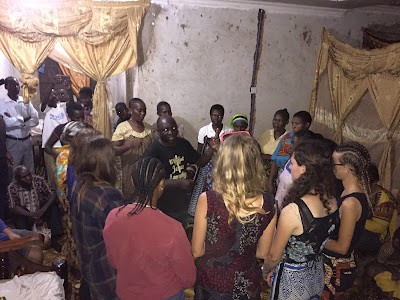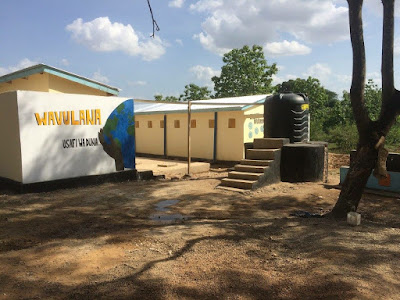After graduating from university, I took the big step
to volunteer in Rural Tanzania for three months, on a sustainable development,
Water, Sanitation, and Hygeine project, funded by the UK government ICS
program, with Raleigh International.
From Academia:
learning and being examined on the sustainability of WASH projects in East
Africa, to writing this blog based on the hydrological impacts of climate change in
this region, and how communities are/ will respond. It was surreal and overwhelming to be in the
beautiful country Tanzania, and be apart of this program! The project was very
hard, being very physically and emotionally challenging, however, was extremely
rewarding, and so would highly recommend to anyone and everyone...
 |
| Group Charlie 5 (Schola, Kim, Amy, Vestina, Callum, Ellie, Jamie, Ally, Ahimeleki, Rosada, Dean, Rhona, Adelle, and Ciaran) and headteacher of Kiberege Magereza Primary School. Photo credits: Sadick |
In September 2017, I travelled to Tanzania to take
part in a three-month volunteer project with Raleigh international, as part of
the International Citizen service (ICS) program. I was lucky enough to be
awarded a £400 individual grant for volunteering from The Jack Petchy
Foundation, which contributed to my £800 target, enabling me to take part in
this amazing programme.
The Raleigh project I volunteered with focussed on
Water, Hygiene, and Sanitation (WASH) in a village called
Bwawani, situated in the Kilombero district of Morogoro, Tanzania. Our team
consisted of Volunteers from both the UK and Tanzania. The core ethos of
Raleigh’s work is creating long lasting sustainable change through youth, this
was the fundamental element of our work in Bwawani. Our project was based in
Kiberege Magereza Primary school, raising awareness about WASH. The overall aim
was to improve community health, life expectancy and opportunities, and prevent
disease outbreaks, in line with guidelines set by the Tanzanian government.  |
| The construction site (Septic tank and foundations of the girls toilet block) at Kiberege Magereza Primary School, before Charlie 5 began the second phase of construction in October 2017 |
Our project in Bwawani started with a huge task ahead of us; overwhelmed with the sheer amount of work we had to complete in a relatively short amount of time, at times doubtful if we could complete what we set out to achieve. Our days were spent on construction site at Kiberege Magereza, building and completing two newly constructed toilet blocks including 18 toilets (with 2 disabled toilets and a menstruation hygiene management room), a water tank, and a hand washing station; with the help of our amazing fundi’s (builders).
 |
| Week 6: Members of Charlie 5 mixing sand and cement for construction. |
However, building toilets will not improve the lives
of this community on its own, education was a key part of the programme. Our
work also consisted of teaching at our school about the importance of water,
sanitation, and hygiene and mobilising our amazing community, together working
towards sustainable behaviour changes over time.
 |
| SWASH Club lesson: Students from Kiberege Magereza giving a presentation to their class on the importance of personal hygiene. |
Our base school had a total of 562 pupils, across 7
academic year groups. In WASH projects, we have one part called training which
involves teaching daily SWASH lessons with the pupils, but we also worked with
the established SWASH club at our school- a group of students who are trained
by Raleigh volunteers to be ambassadors, and help with awareness campaigns in
the community, especially after volunteers are gone. Our SWASH club had an
astonishing 55 members, of dedicated students who attended weekly sessions,
establishing ways to mobilise their school and home communities. Being
intelligent and engaged students wanting to contribute to this change, these
young people were an inspiration, being receptive and fully on board with this
movement towards development.
 |
| The SWASH Club during their performance at our Second Action day in Bwawani Village. |
All the lessons we taught were extremely important for
the student’s wellbeing and health, however, a true a highlight of my ICS
experience was involved in teaching Menstrual Hygiene Management (MHM). Being a
topic which is a taboo among this community, like many others in Tanzania, we
approached this very carefully. We firstly had meetings with women in the
village, and parents and teachers of the students at the school. The response
at these meetings were overwhelming to say the least. This community was more
than ready for change and there was a sense of relief: they wanted their girls
(from a suitable age) to be taught the truths about MHM, and that it is a
normal change that they will experience. What was more mind-blowing, was the
demand to teach the boys, about the changes the girls, and they will go
through, and the importance of respect. Teaching MHM gave a real sense of
achievement. Seeing the girls so engaged and empowered to ask so many
questions, and participate so actively in the classes, really gave a sense
purpose and reminded the reasons I chose to take part in ICS Raleigh.
 |
| Members of Charlie 5 (Vestina, Rhona, and Sadick) carrying out an end of project survey with a Standard One student at Kiberege Magereza Primary School. |
To do this we held mobilisation meetings and action days in the village; these proved very successful, bringing together the whole community, raising awareness of the importance of our work in Bwawani, spreading knowledge, and building relations within the community. Over 600 people attended our second action day in Bwawani village. New to Raleigh, we also introduced requested weekly WASH lessons with the village elders, which proved successful among the villagers.
 |
| Tippy Tap relay race at our first Action day at Kiberege Magereza Primary School: The first team to perform all six stages of hand washing in the relay wins a prize of a bag of soap. |
 |
| The Village Chairman during his speech about the importance of WASH and our work in Bwawani and Kiberege Magereza Primary School, at our second action day. |
The project came with its many challenges, which is
inevitable due to its sheer size, and the amount of work that needed to be
completed in a short space of time. However, that made every second all the
more worth it. My time in Bwawani village was life changing; knowing the impact
it had on the pupils at Kiberege Magereza primary school, our homestay
families, the community of Bwawani, my team, and me, is indescribable. I thank
Bwawani, and all our homestay families for letting me experience village life as a local and making us all
feel so welcome and part your family. My gratitude for this community being open and ready to learn,
for change and for development, is what made this project successful.
 |
| Charlie 5 and the members of SWASH club, at our opening of the toilet blocks, SWASH Club graduation and handover. |
 |
| The female members of Charlie 5, and members of Bwawani during a Kitenge Ceremony on our Final Evening In Bwawani village. |
Sustainable development volunteering projects like ICS
bring about positive and sustainable changes to communities that are ready to
learn. It is therefore extremely disappointing that the department for
international development (UK government) are reviewing the funding for ICS.
From first- hand experience I have seen how important youth led development is,
and how huge the impact is for communities like Bwawani, and both UK and
Tanzanian volunteers involved.
I have been truly blessed to have been able to meet, work and share this unforgettable experience with the amazing members of Charlie 5 for three months. Raleigh Tanzania do a fantastic job of challenging their volunteers to create sustaining change, not just while on project but at home in their local communities too. Bwawani we all really do hope that you are encouraged for your future, the young people you have are truly shining stars, a real inspiration. You can all be the mobilisers of change; challenge yourselves to change your world!
I have been truly blessed to have been able to meet, work and share this unforgettable experience with the amazing members of Charlie 5 for three months. Raleigh Tanzania do a fantastic job of challenging their volunteers to create sustaining change, not just while on project but at home in their local communities too. Bwawani we all really do hope that you are encouraged for your future, the young people you have are truly shining stars, a real inspiration. You can all be the mobilisers of change; challenge yourselves to change your world!
 |
| Some students of Kiberege Magereza Primary School using the hand washing station. |






No comments:
Post a Comment